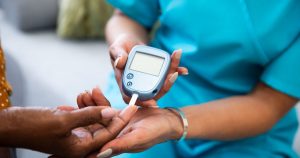July 5, 2024 From Medscape

Maintaining optimal glucose levels is crucial for overall health, especially for individuals who are overweight, obese, or have impaired glucose regulation. Recent research led by Antonio Clavero-Jimeno from the Department of Physical Education and Sports at the University of Granada sheds light on how the timing of physical activity influences glucose control. This study, published in Obesity, explores the benefits of evening exercise for improving glucose homeostasis in sedentary adults with metabolic impairments.
Study Overview
The study involved 286 adults from Spain with a mean age of 46.8 years, half of whom were women. All participants were either overweight or obese, with an average BMI of 32.9, and had at least one metabolic impairment, such as high blood pressure, abnormal lipid levels, or poor glycemic control. They reported being generally inactive.
Over two weeks, participants’ physical activity and glucose levels were monitored using an accelerometer and a continuous glucose monitoring device. Based on the duration and timing of their moderate to vigorous physical activity (MVPA), participants were categorized as inactive, somewhat active, active, or very active. Physical activity was also classified by time of day: morning, afternoon, evening, or mixed.
Key Findings
The study revealed significant insights into how the timing and amount of physical activity can affect glucose levels:
- Activity Levels and Glucose Reduction:
- On somewhat active and very active days, 24-hour mean glucose levels were lower by approximately 1.0 mg/dL and 1.5 mg/dL, respectively, compared to inactive days.
- Evening Activity Benefits:
- Physical activity concentrated in the evening was associated with lower mean glucose levels compared to inactivity: 24-hour (−1.28 mg/dL), daytime (−1.10 mg/dL), and overnight (−2.14 mg/dL).
- Afternoon Activity Effects:
- Afternoon activity also showed benefits, particularly for overnight glucose levels. Compared to inactivity, it was associated with lower 24-hour (−0.98 mg/dL) and overnight (−1.72 mg/dL) mean glucose levels but did not significantly affect daytime levels.
- Impact on Individuals with Impaired Glucose Regulation:
- The benefits of evening and afternoon activity were more pronounced in participants with impaired glucose regulation, with similar effects observed in both men and women.
Implications for Practice
These findings suggest that incorporating moderate to vigorous physical activity in the evening can be a promising strategy for improving metabolic health, particularly for those at risk of developing cardiovascular diseases. Health professionals and individuals should consider the timing of physical activity as a factor in managing glucose levels and overall metabolic health.
Study Limitations
While the results are promising, the study’s observational nature limits the ability to establish causal relationships. The lack of data on dietary intake and stress levels, which can influence glucose regulation, is another limitation. Additionally, the study’s focus on a sedentary population means the observed effects might differ in more active individuals.
This research highlights the potential of evening physical activity to improve glucose control in sedentary adults with overweight or obesity. By focusing on the timing of exercise, individuals can adopt more effective strategies to enhance their metabolic health and reduce the risk of cardiovascular diseases.
=================================================================
Considering an IME or document review to resolve an insurance claim, legal file, or workplace health and safety issue?
Our specialists provide evidence-based opinions, so get in touch with Western Medical today to learn more about our services.

